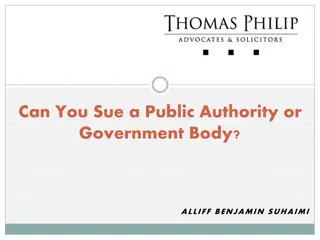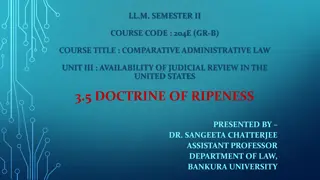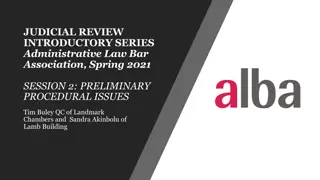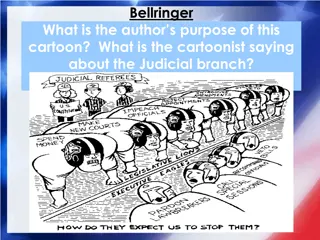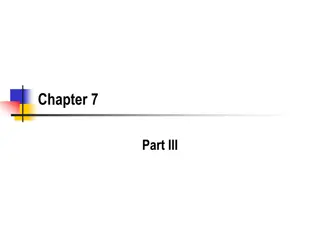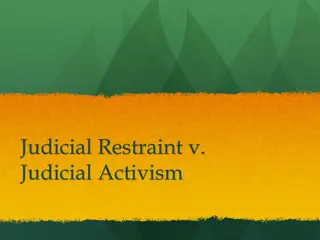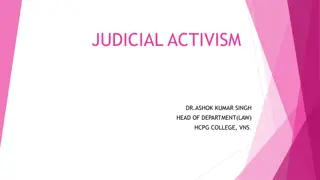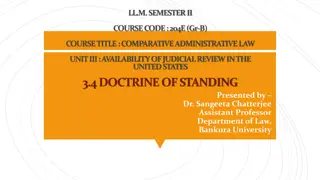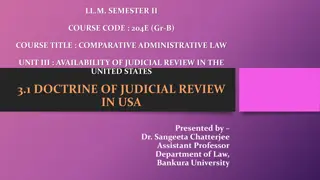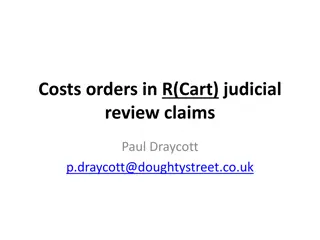Challenges and Opportunities in Judicial Review Costs
CPRE Kent appealed for a fairer costs order in a local plan challenge, seeking better access to justice. Key cases like Mount Cook and Luton highlight the complexities in costs allocation. The appeal to the Supreme Court aims to address these challenges and seeks clarity on the proportionality approach.
Download Presentation

Please find below an Image/Link to download the presentation.
The content on the website is provided AS IS for your information and personal use only. It may not be sold, licensed, or shared on other websites without obtaining consent from the author. Download presentation by click this link. If you encounter any issues during the download, it is possible that the publisher has removed the file from their server.
E N D
Presentation Transcript
INTERESTED PARTY COSTS IN JUDICIAL REVIEW RICHARD BUXTON RICHARD BUXTON SOLICITORS ENVIRONMENTAL PLANNING AND PUBLIC LAW CAMBRIDGE rbuxton@richardbuxton.co.uk Tel: 01223 328933
SUMMARY CPRE Kent appealed paper costs order (only) in local plan challenge Court of Appeal followed Mount Cook Unsatisfactory rules remained in place Supreme Court granted PTA Glimmer of hope for better access to justice We need help from other JR practitioners to nail this!
MOUNT COOK R (Mount Cook Land Ltd.) v. Westminster City Council [2003] EWCA Civ 1346. Big Council, big developer, no IP Dispute about costs awards of oral hearings Shortly after new CPR and Leach [2001] EWHC Admin 455 The effect of Leach certainly in a case to which the Pre-Action Protocol applies is that a successful defendant or other party at the permission stage who has filed an acknowledgement of service pursuant to CPR 54.8 should generally recover the cost of doing so from the claimant, whether or not he attends any permission hearing .
EFFECT Gospel that for awards to IPs at the paper permission stage are OK Unpredictable whether in fact awarded but always a danger Confirmed in R (Luton BC) v. Central Bedfordshire Council [2015] EWCA Civ 537 as ordinary principles IP claims tend to be substantial In Aarhus cases results in default costs limits being used up at permission stage Where no Aarhus cap, can be truly frightening levels of exposure
APPEAL IN CPRE KENT CASE Default cap of 10k Approx claims: SS 3.5k, LPA 5k, IP 8k The 10k used up in order so IP in fact awarded 1.5k We say should be 3.5k: only one set, as in Bolton v SSE (Practice Note) [1995] 1 WLR 1176 Decided to appeal in public interest Planning LJ in CA recognised problem and granted permission CA at hearing tried to reconcile Mount Cook and Luton with Bolton Proportionality approach - further confusion
APPEAL TO SUPREME COURT CA reasoning re Bolton wrong, and ditto Mount Cook No account of other cases incl Berkeley (x 2), Ewing, etc. Proportionality approach highly unsatisfactory Costs of submission on duplication etc. Examples of problems caused [NB not appealing issues of correct defendant in statutory appeal cases or as such eating into the Aarhus cap excessively at permission stage]
**** PTA GRANTED 28 FEBRUARY 2020 **** Timing unknown, but advise staying costs orders pending SC sorting SC wants examples of practical effects of IP costs problem So HELP PLEASE Experience of issue in non-Aarhus cases? Experience in Aarhus cases? Please provide details! (Even if some deal was struck later, need to know order made on paper and/or at oral hearing)













